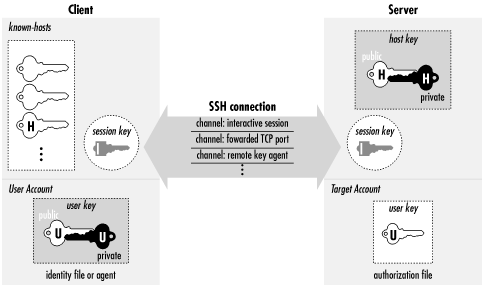Architecture of an SSH System
SSH has about a dozen distinct, interacting components that produce the features we've covered. ["Overview of Features"] Figure 3-1 illustrates the major components and their relationships to one another.
Figure 3-1. SSH architecture
By "component" we don't necessarily mean "program:" SSH also has keys, sessions, and other fun things. In this section we provide a brief overview of all the components, so you can begin to get the big picture of SSH:- Server
- A program that allows incoming SSH connections to a machine, handling authentication, authorization, and so forth. In most Unix SSH implementations, the server is
sshd. - Client
- A program that connects to SSH servers and makes requests, such as "log me in" or "copy this file." In SSH1, SSH2, and OpenSSH, the major clients are
sshandscp. - Session
- An ongoing connection between a client and a server. It begins after the client successfully authenticates to a server and ends when the connection terminates. Sessions may be interactive or batch.
- Key
- A relatively small amount of data, generally from tens to one or two thousand bits, used as a parameter to cryptographic algorithms such as encryption or message authentication. The use of the key binds the algorithm operation in some way to the key holder: in encryption, it ensures that only someone else holding that key (or a related one) can decrypt the message; in authentication, it allows you to later verify that the key holder actually signed the message. There are two kinds of keys: symmetric or secret-key, and asymmetric or public-key. ["Public- and Secret-Key Cryptography"] An asymmetric key has two parts: the public and private components. SSH deals with four types of keys, as summarized in Table 3-1 and described following the table.
-
Table 3-1. Keys, Keys, Keys
Name Lifetime Created by Type Purpose User key Persistent User Public Identify a user to the server Session key One session Client (and server) Secret Protect communications Host key Persistent Administrator Public Identify a server/machine Server key One hour Server Public Encrypt the session key (SSH1 only) - User key
- A persistent, asymmetric key used by clients as proof of a user's identity. (A single user may have many keys/identities.)
- Host key
- A persistent, asymmetric key used by a server as proof of its identity, as well as by a client when proving its host's identity as part of trusted-host authentication. ["Trusted-host authentication (Rhosts and RhostsRSA)"] If a machine runs a single SSH server, the host key also uniquely identifies the machine. (If a machine is running multiple SSH servers, each may have a different host key, or they may share.) Often confused with the server key.
- Server key
- A temporary, asymmetric key used in the SSH-1 protocol. It is regenerated by the server at regular intervals (by default every hour) and protects the session key (defined shortly). Often confused with the host key. This key is never explicitly stored on disk, and its private component is never transmitted over the connection in any form; it provides "perfect forward secrecy" for SSH-1 sessions. ["Establishing the Secure Connection"]
- Session key
- A randomly generated, symmetric key for encrypting the communication between an SSH client and server. It is shared by the two parties in a secure manner during the SSH connection setup, so that an eavesdropper can't discover it. Both sides then have the session key, which they use to encrypt their communications. When the SSH session ends, the key is destroyed.
TIP: SSH-1 uses a single session key, but SSH-2 has several: each direction (server to client, and client to server) has keys for encryption and others for integrity checking. In our discussions we treat all SSH-2's session keys as a unit and speak of "the session key" for convenience. If the context requires it, we specify which individual key we mean.
- Key generator
- A program that creates persistent keys (user keys and host keys) for SSH. SSH1, SSH2, and OpenSSH have the program
ssh-keygen. - Known hosts database
- A collection of host keys. Clients and servers refer to this database to authenticate one another.
- Agent
- A program that caches user keys in memory, so users needn't keep retyping their passphrases. The agent responds to requests for key-related operations, such as signing an authenticator, but it doesn't disclose the keys themselves. It is a convenience feature. SSH1, SSH2, and OpenSSH have the agent
ssh-agent, and the programssh-addloads and unloads the key cache. - Signer
- A program that signs hostbased authentication packets. We explain this in our discussion of trusted-host authentication. ["Trusted-host authentication (Rhosts and RhostsRSA)"]
- Random seed
- A pool of random data used by SSH components to initialize software pseudo-random number generators.
- Configuration file
- A collection of settings to tailor the behavior of an SSH client or server.